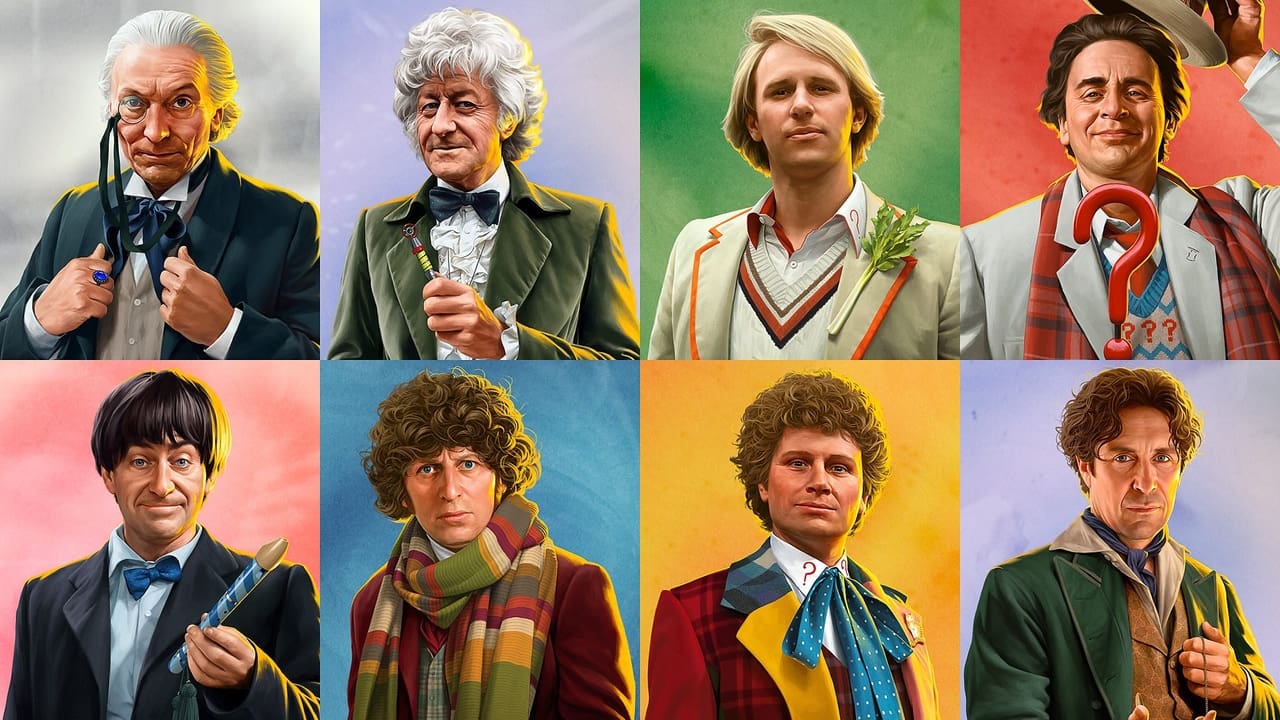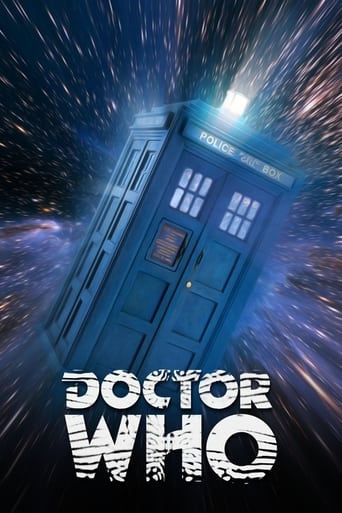

Dr. Who is Brilliant, I've been watching the series since i was 5 years old. As a kid i loved getting scared by the monsters, the monsters that scared me the most were the Autons.The two most memorable scenes which scared me the most where: the start of the invasion, when the Autons start coming to life and massacring people (from Spearhead From Space Episode 4 and The Autons Massacring people in Rose (Series 27 Episode 1).If you love science fiction, action, historical and mysterious movies your love Doctor Who.If you decide to watch Doctor Who i recommend starting of at the very begging.there are 96 episodes currently missing from the BBC archives, however some of the missing episodes have been brilliantly animated using the original soundtracks.
... View MoreOf all the TV series I've seen, this is in my mind the best, since it had a huge impact in my life, ever since I first saw it in 1982! William Hartnell, Patrick Troughton, Jon Pertwee, Tom Baker, & Peter Davison represent the program for me, an imaginative, intelligent, engaging and fun adventure for the first 21 years....then alas it went off the rails disastrously, becoming a gaudy, unappealing mess with the miscast Colin Baker and poor writing ruining my favorite series. I just ignore the final five years as a result(though Sylvester McCoy was fine, the irreparable damage had been done...) I remember wishing that I could travel with the Doctor as a companion and share in his adventures, but then again, so haven't millions of fans. The Tardis is still like a second home for me, and I can revisit it anytime I like now that the DVD range is complete!
... View MoreDoctor Who has been around longer than I have been alive. It's continually entertaining and often has complex and thought provoking concepts. Also, it's one of the longest running scifi shows in television history. The idea of time travel combined with the interactions of normal lives added to the theories of einstein and other scientist who postulate what would happen if we did travel in time are not only entertaining, but challenge us to examine our own thought processes regarding interaction with others. Is this the longest running program in TV history? I know its not the longest without an interruption..but certainly the longest non-consecutive program..yes?
... View MoreWhile I fully acknowledge that the "traditional" Doctor Who series has endured its ups and downs, I gave it a perfect rating because of its very concept and energy. One character, the time-traveling Doctor, could be interpreted by several different actors in so many different aspects. This ensures a long lifespan for any television show, but the Doctor's space-time travels offer so many story-telling opportunities, regardless of the limited BBC budget or the occasional blooper. Doctor Who began as a BBC family show in 1963, in those days when families -- especially in the UK -- were fortunate to own a single TV set. Most fans consider the classic show in terms of which actor portrayed the Time Lord during which period. When William Hartnell began this role in 1963, no one could have envisioned six other actors playing the same character, until the conceptual introduction of "regeneration" in 1966's "The Tenth Planet." Hence, the Second Doctor, played for three years by Patrick Troughton, has his own "era" of adventures before his regeneration into Jon Pertwee in 1969's "The War Games," and so forth.Unfortunately, many of the episodes of Hartnell and Troughton's tenures were destroyed by the BBC (or stolen in some cases) when their 1960s overseas resale values had expired. Periodically, "lost treasures" have been recovered by the BBC, such as the entire four-part Patrick Troughton story, "Tomb of the Cybermen," located in 1991 at Hong Kong.One of the show's perennial attractions were its monsters and villains, adversaries for the Doctor and his friends. Beginning with the Daleks, those robotic mutants who spawned two films and "Dalekmania," Doctor Who has created its own unique mythology. Cybermen, while similar to the Cybernauts from the original TV Avengers, certainly inspired Star Trek: TNG's well-known Borg Collective. Other alien races have been introduced, as well as the Doctor's renegade arch-enemy, the Master. At various points in the show's history, Doctor Who attempted to grow in terms of maturity, albeit not in the provocative sense of the 2005 BBC-Wales production. In fact, I approve of IMDb's separate category for the newer series, because it bears only topical similarity to the original. Unfortunately for traditional Doctor Who, parental concern over violence (mostly alarmist) and conservative watchdogs like Mary Whitehouse served as a shackle to prevent the show from reaching its logical potential. In comparison to U.S. productions, however, this series seldom ventured beyond PG boundaries of violence. Sexuality rarely entered the picture, even though many of the Doctor's female companions were considered attractive, even glamorous.I am not going to speculate on my favorite Doctors, because I have enjoyed each actor's contributions at various points. I will leave prospective Doctor Who fans to discover their "favorite" Doctors for themselves. But as to general hints, William Hartnell began the role as a stern grandfatherly figure with occasional whimsy, while Patrick Troughton's whimsical wanderings masked an enigmatic intellect. Jon Pertwee's debonair Third Doctor resembled John Steed of the Avengers with perhaps a dash of James Bond, with Pertwee's love of gadgets and cars. Pertwee's era also debuted in color, well-remembered for its contemporary Earth-based format and the UNIT family.After 7 years as the Doctor, Tom Baker became an icon, especially in the United States, where syndication and Public TV brought new fans and convention appearances starting in 1979. Baker's trademark grin and long scarf became famous, as did his off-screen clashes with some directors and producers. But Tom Baker's departure in 1981 marked a great time of trouble for the classic series. Incoming producer John-Nathan Turner would helm the series for its remaining decade, but he would be challenged to retain the show's once-invincible position. Arguably, Turner's removal of Doctor Who from its traditional Saturday tea-time slot caused a decline in viewers. John-Nathan Turner sought to attract famous guest stars, and wanted a well-known actor to play the Fifth Doctor. Previous Doctors had been played by experienced character actors, whilst Tom Baker had been a virtual unknown. Peter Davison, already a television star in England, portrayed a much younger Doctor in a cricket blazer, with more subtle humor and a touch of irascibility. Davison's tenure lasted only three years, before John-Nathan Turner chose Colin Baker, best known for playing villains. Wearing a psychedelic jacket and a cat badge, the Sixth Doctor's crusade for galactic justice was plagued by renewed complaints of violence. After a year's hiatus, Doctor Who seasons were reduced to 14 episodes and four stories, and Colin Baker was unfairly dismissed in 1986 by BBC chief Michael Grade.Doctor Who might have been phased out without a trace, if not for the valiant efforts of Sylvester McCoy, another obscure actor chosen to play the Seventh Doctor. After an uncertain first season, McCoy's portrayal had won over young fans despite some rather weak story lines. However, his last two seasons featured some genuine classic moments. Toward the end, McCoy's portrayal grew more somber and manipulative, even toward his companion, Ace. But when the series finally ended in 1989, the Seventh Doctor's era ended on a high note in "Survival," after the Doctor and Ace outwit the Master for a final victory. One can still take the original series without reading the copious fan-fiction novels that ensued after 1991, or accepting the premises of either the 1996 Telemovie or the new series, which has destroyed or radically altered many of Doctor Who's original concepts. 26 years remains a body of work unto itself, and I believe families can still sit together and enjoy the legend almost 50 years after it began.
... View More